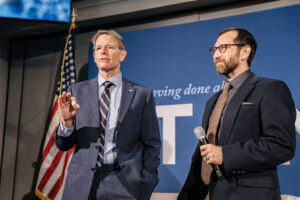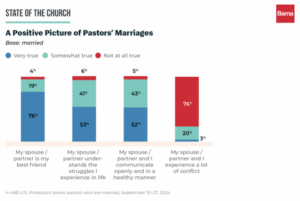
EDITOR’S NOTE: An audio version of this column is available at https://media1.imbresources.org/files/48/4804/4804-25532.mp3
RICHMOND, Va. (BP)–Faith, culture and business often travel together — for better and worse.
For better when believers follow explorers and traders to new places and peoples — or get there first — and bring the Good News of salvation with them.
For worse when misguided or unscrupulous merchants, conquerors and evangelists use religion as an excuse to exploit and oppress the peoples they encounter.
Worse, too, when believers allow their main message to get drowned out by the clatter of lesser things. A new generation of activist Christians would do well to remember that as they launch into the world.
Many eager young evangelicals, particularly college students, are zealously seeking to change things at home and abroad through social and political activism — advocating for human rights and environmental protection, fighting global poverty and human trafficking, promoting freedom and democracy.
These young activists are a breath of fresh air after years of apparent lethargy and indifference on U.S. campuses. They bring a distinctively Christian perspective and sense of calling to causes often dominated by secular groups. They also follow in a noble tradition:
— William Carey (1761-1834), the father of modern evangelical missions, left England to bring the Gospel to the people of Bengal. He also put their language into written form, spread knowledge and education, battled destructive indigenous traditions and challenged the oppression of British colonial rule in India.
— David Livingstone (1813-1873) of Scotland, the most famous missionary of the 19th century, ventured to Africa to preach Christ and became the first European (besides slave traders) to reach the interior. He made few converts, but mapped the continent, brought Africa vividly to the consciousness of the West through his writing and speaking, and fought slavery with all his might. Livingstone was later accused of being an imperialist for his eagerness to bring Christianity, Western culture and commerce to Africa. But in an age of often-brutal colonial exploitation, he was a courageous exponent of the principle that all human beings — including Africans — are equal, precious in the sight of God and endowed with basic rights by their Creator.
Livingstone passionately believed in the power of the Gospel to bring life eternal — and better daily lives for people in the here and now. Legions of dedicated Christians have followed his optimistic path, bringing social progress, freedom, education and economic prosperity to many places.
But therein lies a danger.
“If you’re someone who believes, as I do, that humanity is fallen and warped in various ways, it’s not surprising there’s no such thing as a perfect social system that produces perfect human beings,” observed Walter Russell Mead, a member of the Council on Foreign Relations, in a recent interview with Christianity Today. “The Anglo-Americans have exploited their power. They have often treated weaker or poorer peoples with great injustice. …
“One of the most exciting things you are seeing today is the increase in serious American evangelical interest in building new kinds of people-to-people connections, whether it’s in Africa or Asia or Latin America — of trying to make a better world for people out there, who increasingly are fellow Christians. … (O)ne of the great values that the Anglo-American world has brought to world politics is this idea of faith in the future and optimism, a willingness to embrace change and even stimulate change to make a better world. But what we see over and over again is that this tends to turn into postmillennial optimism, where we’re going to be creating utopia now.”
What Christians need today more than ever, Mead believes, is “a rooted and grounded activism in the world that understands … that humanity is imperfect, that perfection will come only from God, and in God’s time and in God’s way — not as the result of human political endeavors.”
The caution for the new movement of Christian activists is this: Keep your priorities straight. Don’t confuse your political ideals — as admirable as they may be — with the Gospel, which transcends politics. Not every culture will embrace your social values, but the Gospel of grace applies to all cultures.
Political freedom, economic progress, human rights and the alleviation of poverty are fine things. Historically, they often have followed the introduction of the Gospel into societies. But they will not transform human hearts or usher in the kingdom of God. Only He can do that — and He does it through the power of His Spirit as the Gospel is proclaimed and people of varied tribes and tongues decide to follow Him.
He transforms hearts in the midst of poverty and plenty, in democracies and dictatorships, in peace and in war, in the East and in the West.
Transformed hearts, in turn, transform nations.
–30–
Erich Bridges is senior writer for the Southern Baptist International Mission Board.














